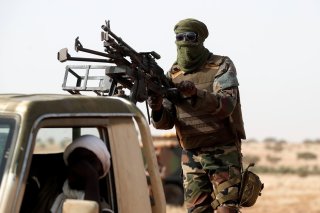Killings in Mali Blamed on Government Forces, Russian Mercenaries
The killings, which took place from March 23 to 31 in the central Malian town of Moura, resulted in at least 300 civilian deaths.
A Human Rights Watch (HRW) investigation of a military operation in the Malian town of Moura implicated the Malian Army and its hired Russian mercenaries in the deaths of hundreds of civilians, according to Reuters.
The killings, which took place from March 23 to 31 in the central Malian town of Moura, resulted in at least 300 civilian deaths, or roughly 3 percent of the town’s population of 10,000. HRW described it as the “worst single atrocity” of Mali’s ongoing armed conflict, now in its second decade.
The HRW report, based on interviews with twenty-seven local witnesses, detailed the week-long period in graphic detail. On the first day, Malian soldiers, accompanied by Russian-speaking mercenaries, arrived in the town and engaged the Islamist insurgents that had occupied it, killing several Islamist fighters and civilians caught in the crossfire.
After a brief gun battle between the two sides, some of the insurgents fled into the desert, while others attempted to blend in with the town’s civilian population. For the rest of the week, the Malian Armed Forces and Russian mercenaries occupied the town, executing suspected Islamist fighters and collaborators. Hundreds of men were taken from their homes and forced to remain on the bank of a nearby river, where they were held for five days. Several dozen were summarily executed and buried in three mass graves outside the town.
Witnesses told HRW that at least 100 Russian-speaking mercenaries had been involved in the incident, including in the executions.
The governments of France, Germany, and the United States condemned the killings, and each called for an independent investigation into the incident.
Before the publication of HRW’s report, the Malian Armed Forces had initially described its occupation of Moura as a significant victory, claiming that around 200 Islamist rebels had been killed during the fighting. In the aftermath of the report’s publication, the government announced that it would conduct a war crimes investigation, although critics noted that the government investigation was unlikely to be neutral and would probably not result in any charges against the officers or soldiers involved.
Mali has been governed by a military junta since mid-2020, when officers loyal to Colonel Assimi Goita overthrew the country’s democratically-elected civilian government. Goita initially agreed to a power-sharing agreement with other civilian leaders, before purging them from the government in a second coup one year later.
The country’s coups have strained relations between Mali and France, its former colonial ruler and traditional European partner. French troops announced in February that they would withdraw from the country after a decade of combating Islamist militants in the Sahel; they have since been replaced with Russian mercenaries from the infamous Kremlin-affiliated “Wagner Group.”
Trevor Filseth is a current and foreign affairs writer for the National Interest.
Image: Reuters

